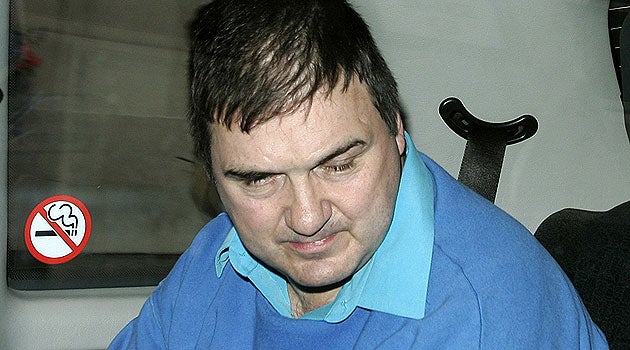After seven years, Barry George cleared of Jill Dando's murder

Barry George was cleared at the Old Bailey today after eight years of trying to prove he did not kill television presenter Jill Dando.
George, 48, was found not guilty of murder after his second trial and two appeals.
George, an epileptic with mental disability, was originally found guilty of murder in 2001.
His first appeal was rejected but a second appeal, in November last year, resulted in the conviction being quashed and a retrial ordered.
The second trial began on June 9 this year, with the judge ruling out evidence that a single particle of firearms discharge residue was found in the pocket of George's coat.
The judge, Mr Justice Griffith Williams, was told that the speck, although of the same type as found on the victim, could have come from other sources.
Today, a jury of eight women and four men rejected the prosecution case that George was the killer who shot Miss Dando, 37, through the head on her doorstep in Fulham, west London.
Now police face the embarrassing task of renewing the search for the gunman nine years after the popular Crimewatch presenter was murdered in April 1999.
George showed no reaction as the verdict was read out.
His sister Michelle Diskin, who was also sitting in court, punched the air and cried "yes".
George was expected to be released and walk free from the Old Bailey today.
As the verdict was read out psychiatrist Dr Susan Young, who was with George in the dock, whispered to him and he nodded.
The jury had been out for less than two days at the end of an eight week trial.
George, a local loner who was said to have stalked and photographed hundreds of women, always maintained his innocence.
He was supported in court by his sister Ms Diskin, who has led the fight for his release.
She had been instrumental in getting the Criminal Cases Review Commission, an independent body which investigates possible miscarriages of justice, to refer the case to the Court of Appeal.
George, known by some as the "local nutter" because of his obsession with Queen singer Freddie Mercury, was arrested a year after the murder.
He was a fantasist who told people he was Mercury's cousin and called himself Bulsara, Mercury's real name.
He became the prime suspect after detectives reviewed the evidence and George's name came up among several others put forward after appeals to the public.
During three weeks of undercover surveillance, he was seen to approach 38 women in the area to try to make conversation with them.
His home in nearby Crookham Road was searched and officers found 2,248 photographs he had taken of unsuspecting women.
The pictures, on 100 rolls of undeveloped film, also had shots of a number of television of women presenters including Anthea Turner.
They also found a gun holster and lists of guns, military magazines and a picture of George wearing a gas mask and holding a starting pistol.
The prosecution said it was the sort of weapon which, if converted, could have fired the fatal shot.
Jonathan Laidlaw QC, said George was a celebrity and gun-obsessed stalker with a grudge against the BBC.
But William Clegg QC, defending, said the prosecution case was circumstantial and there was no direct evidence that George was the killer.
He said the prosecution could not prove that the killer seen by two witnesses shortly after the shooting at just after 11.30am, was George.
The witnesses, one of whom has since died, had not identified George.
The case hinged on the killer being the same man that other witnesses had described as being of Mediterranean appearance who had been identified or partially identified as being George.
Mr Clegg said: "There is insufficient evidence and a fatal weakness in the Crown's case."
During police interviews, George said he had not known of Dando or where she lived before her death was in the news.
He said: "I have never seen Jill Dando in the flesh in any shape or form."
George worked for a short time as a messenger at the BBC but he frequently called in there to collect copies of the staff newspaper.
He was arrested by police in 1983 hiding in bushes outside Kensington Palace in an attempt to see Diana, Princess of Wales.
He was dressed in combat gear, was carrying a length of rope and had a knife in his belt. He was not charged.
George was often in trouble with the police, with complaints made against him for sexual assault.
He was convicted of attempted rape and his Japanese former wife complained that he beat and raped her.
The Crown Prosecution Service defended its decision to bring the case against George, saying it was "fit to be put before a jury".
CPS reviewing lawyer Hilary Bradfield said: "Mr George now has the right to be regarded as an innocent man, but that does not mean it was wrong to bring the case.
"Our test is always whether there is sufficient evidence for a realistic prospect of conviction - it would be wholly wrong to only bring cases where we were guaranteed a conviction.
"At the first appeal, the Court of Appeal considered it to be a sound identification case, whilst at the second appeal the court allowed the appeal on a very narrow point concerning the firearms discharge residue, which was not used this time, but ordered that a retrial should take place.
"The fact that the trial ran its full course confirms that although it has changed in detail, the circumstantial evidence in this case which has been tested over and over again by the courts was judged fit to be put before a jury."
Bookmark popover
Removed from bookmarks